Allison M. Dickson's Blog, page 26
June 12, 2011
Review: Super 8
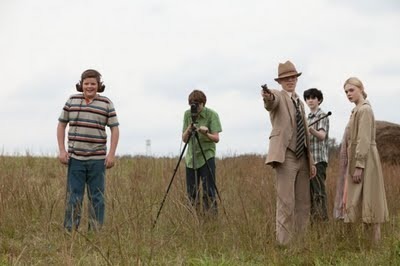
I didn't want to slap any of these kids.
Remember when there used to be movies starring kids you didn't want to throttle in some way? Kids in movies used to be funny and gutsy and maybe even a little foul, rather than artificially obnoxious, politically correct, or saccharine. They used to be fully fleshed out people instead of plot devices or marketing tools. They sometimes swore or acted uncouth, because when your parents weren't around, isn't that what you used to do too? I know I did. I was also certain there was magic in the world waiting to be unlocked or discovered under any rock or behind any tree. We wanted to DO things. Play pretend, write stories, become rock stars, brilliant athletes, or filmmakers. Every neuron was firing at that age. Everything was possible. My friends and I, we had plans, dammit. Nothing was bigger than us or standing in our way.
That's how Super 8 made me feel all over again. It took every exuberant, thrilling, dangerous, and sometimes scary and sad moment from my childhood, and injected it into a film that is every one of those things and more.
The year is 1979. Young Joe Lamb (newcomer Joel Courtney, who I predict has a long career ahead of him) lives in a small Ohio steel town. He just lost his mom in an industrial work accident, and his dad (Kyle Chandler of NBC's Friday Night Lights), becomes even more detached in his grief and immerses himself in his duties as the local Sheriff Deputy. Meanwhile, Joe occupies himself with a group of friends who are busy making a zombie movie to submit to the Cleveland Film Festival. This introduces us to a colorful cast of kids. Riley, driven director. Cary, the burgeoning pyrotechnician. Martin, the soft and sensitive type. Of course, their film needed a feminine touch, so they brought Alice (the extremely talented Elle Fanning) on board. Joe has a thing for her, but because his dad hates her dad, their association with one another causes some understandable friction.
As they're filming a pivotal scene for their flick on the Super 8 camera, they witness (and are nearly killed by) a huge and explosive train derailment that makes the one in Harrison Ford's The Fugitive feel positively anemic. With massive train cars flying several feet into the air, or through it like missiles, a wreck of this scale would be impossible in the physical world, but that's not the point. From the kids' point of view, they're practically in World War III and we the audience feel their abject terror.
Sinister things spawn from the wreckage, and over the course of several days, it turns their small town into a military zone. I won't reveal the details and spoil the fun of discovering them, but I will say that the execution of the plot from this point was highly evocative of E.T. and Jaws. Writer and director J.J. Abrams studied intently in the School of Spielberg (who happens to be the film's producer), and he wisely doesn't show too much too soon. Instead, we see people disappearing from the town, along with all their electronics, car engines, and dogs. And these kids, of course, feel driven to investigate.
Any other writer and director would have made all these characters and their conflicts feel both overwrought and flat, but J.J. Abrams is smarter than that. The grieving deputy is handled with just enough subtlety to keep him from becoming a cliche, and the kids--products of an era where manners and respect for one's elders were both still in wide practice--never fall into that tired and overused trope of "we're smarter than all the adults around us." In contrast to what you might see from any other film featuring a young cast, the kids aren't made into heroes by comparing them to stupid grown-ups. They're shaped by their circumstances. They're also scared as hell, and because they're good kids and we believe them as actual human beings, we care for them and are afraid for them.
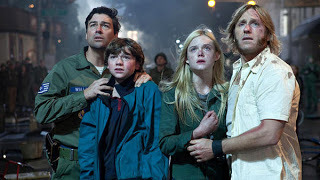 Super 8 feels like Spielberg nostalgia on steroids. It doesn't go for cheap scares or laughs. Nary a fart joke will be found here. Its human interactions are genuine and moving, on par with those you'd find in the Harry Potter films, and the plot is engaging and well-developed.
Super 8 feels like Spielberg nostalgia on steroids. It doesn't go for cheap scares or laughs. Nary a fart joke will be found here. Its human interactions are genuine and moving, on par with those you'd find in the Harry Potter films, and the plot is engaging and well-developed.It's difficult to classify this as a family film, because the offerings of that genre today range from cringe inducing to cheap and hollow. Your kids will not be coddled or asked to swallow an easy pill. Super 8 will scare them a little, but rest assured that the film is also smart enough to know when to pull its punches and let the heart and humor shine through.
I personally can't wait to show this film to my 8 and soon-to-be 10-year-old, because it features the kinds of kids I know or have known. Or once was, myself. This is the best movie of the year so far.
Grade: A+
Published on June 12, 2011 16:05
June 4, 2011
Review: X-Men: First Class
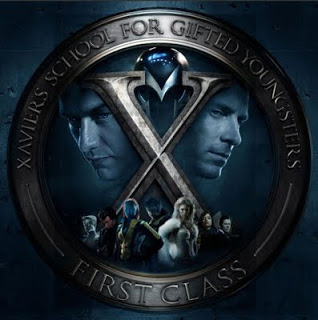
Xcellence x Infinity
WARNING: THIS FILM REVIEW CONTAINS OPINIONS NOT INFLUENCED BY FANGIRL SENTIMENTS. ALLISON DICKSON HAS NEVER READ A SINGLE X-MEN COMIC, AND HAS NO INTEREST IN DOING SO.
With that out of the way, let's talk about the movie, which manages to be the best this over-saturated genre has offered since Christopher Nolan's last contribution to it.
I know that probably sounds a bit surprising when you take into account the more recent offerings from the X-Men franchise. X-Men: The Last Stand, directed by the perennially uninteresting Brett Ratner, had all the appeal of a cracked plaster wall with one of those hideous wallpaper borders featuring ducks or the color mauve. And I once summed up X-Men Origins: Wolverine with the following haiku:
The only part thatshowed any real charisma:Hugh Jackman's eyebrow
So my expectations were somewhat circling the drain, and when I casually mentioned to the guy behind the popcorn counter that I hoped this thing didn't blow donkeys, I learned of its positive buzz. He said, "I heard it was the best of the entire series." He wasn't talking out of its ass after all.
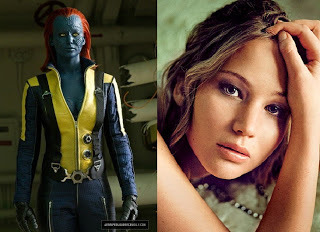 After that, I felt a little less dread about the whole thing. After all, James McAvoy is in it, and he's been stomping on my Anglophile button for awhile now. And the guy who plays Magneto (Michael Fassbender, who among other things played a short but excellent role in Tarantino's Inglourious Basterds) has deftly avoided any and all contact with the ugly stick. The same could be said for Jennifer Lawrence (in the role(s) of Mystique/Raven), who could eat crackers made out of tetanus-coated razorblades and still not be kicked out of bed for it.
After that, I felt a little less dread about the whole thing. After all, James McAvoy is in it, and he's been stomping on my Anglophile button for awhile now. And the guy who plays Magneto (Michael Fassbender, who among other things played a short but excellent role in Tarantino's Inglourious Basterds) has deftly avoided any and all contact with the ugly stick. The same could be said for Jennifer Lawrence (in the role(s) of Mystique/Raven), who could eat crackers made out of tetanus-coated razorblades and still not be kicked out of bed for it. Director Matthew Vaughn is making all the right movies lately (Kick-Ass, Stardust, Layer Cake), and he escapes the clutches of mediocrity by combining elements of historical fiction (namely the Cuban Missile Crisis) with the over-the-top-bordering-on-absurd fun of other superhero franchises of the 1960s. Don't expect earnest realism or historical accuracy here. If you can buy the existential plight of a chick with blue skin, then you can forgive the less-than-accurate portrayal of the day we almost nuked Russia. But X-Men First Class greatly escapes eyerolls and cynic "whatevs" on the strength and emotional weight of its lead performances.
Fassbender as the vengeance-minded Erik Lenhsherr was captivating from his first scene, as he seeks out his Nazi tormentors, applying his mutant capability of controlling metal with ass-kicking ferocity. He's mainly on the hunt for Sebastian Shaw (a delightfully menacing Kevin Bacon), whose forays into genetic experimentation for the Nazis turned him into a bit of a, to put it lightly, genocidal asshole. Oh yeah, he also killed Erik's mom, so dude was asking for it.
 When Erik meets up with the suave and cocky young Charles Xavier, a non-handicapped telepath who has devoted his education to the study of genetic mutations, we can already see where things are headed. Xavier wants to cooperate with the humans and create a harmonious existence between man and mutant by forming a team of other mutants to work with the CIA. But Erik wants to avoid any possible tyranny and inevitable experimentations. As a concentration camp survivor, he has reason to be suspicious. And because we can equally understand Xavier's more compassionate and optimistic approach, we find ourselves liking and sympathizing with both men and (at least in my case) wanting to be the meat in their Bromance Sandwich.
When Erik meets up with the suave and cocky young Charles Xavier, a non-handicapped telepath who has devoted his education to the study of genetic mutations, we can already see where things are headed. Xavier wants to cooperate with the humans and create a harmonious existence between man and mutant by forming a team of other mutants to work with the CIA. But Erik wants to avoid any possible tyranny and inevitable experimentations. As a concentration camp survivor, he has reason to be suspicious. And because we can equally understand Xavier's more compassionate and optimistic approach, we find ourselves liking and sympathizing with both men and (at least in my case) wanting to be the meat in their Bromance Sandwich.This interplay between "good and evil" has always been the X-Men franchise's strongest point. We know they're mutants, because the ability to disagree about politics over a game of chess is clearly superhuman. These two men need and respect one another, and when their kinship inevitably crumbles under the strain of their philosophical differences (nobody's perfect), the pain feels real.
Add in the other strong performances, amusing cameos, and the way we can glimpse the seedlings of what's to come in the series we're already familiar with, X-Men: First Class grabs us hard by the collar and takes us for a seriously fun ride. I've grown weary of comic book movies. We have several more ahead of us this year alone, and next year's slate is jam-packed. I fear this one will be lost in all that noise, but am grateful to see the genre still has plenty of life in it (at least until Zack Snyder sucks it out), and I look forward to seeing what this group comes up with next.
Grade: A
Published on June 04, 2011 13:39
May 26, 2011
New eBook Release and Other Writerly Happenings
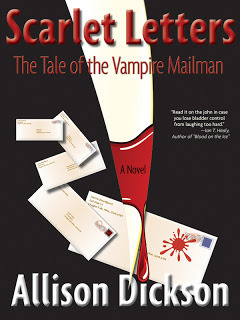 I haven't provided much of an update in the world of Allie (the writer) since returning from the conference.
I haven't provided much of an update in the world of Allie (the writer) since returning from the conference.Yes, I've epublished my book Scarlet Letters: The Tale of the Vampire Mailman on Smashwords and Amazon, but more on that in a minute.
First, I received a response from Joanna Volpe, whom I pitched on The Stargazers at the Pikes Peak Writers Conference. While it was ultimately a rejection, she was incredibly helpful in identifying areas that she thought were weak as well as the ones that were strong. She remembered me specifically from the pitch and was incredibly supportive and friendly there as well, so I'm so pleased I met her. I hope to be able to query or pitch to her again in the future, because those who have her as a representative are incredibly lucky and I'd love to be among them.
But because I've had my head buried in that story for three months nonstop working on revisions, I've decided to put it away for awhile so I can just let it (and my brain) rest. See, I've discovered something recently. It was when I cracked open Scarlet Letters to revise it last week. I hadn't looked at that particular book in the better part of a year, and as some of you might have read a few months ago, I had originally decided to shelve it permanently, giving it up for lost.
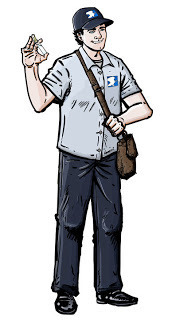
Louis Cross, hero of Scarlet Letters, through the brilliant artistry of Justin Wasson
In other words, I let the story (and the rejections it received...and really not all that many rejections, like maybe a dozen or so, which is basically nothing) defeat me. I'm more easily cowed than I think. My very supportive husband and friends (who had read the story in earlier drafts and enjoyed it, and who wouldn't just blow sunshine up my ass either) didn't agree with my decision. They thought it was a fun read and didn't want me to give up on it. My husband suggested maybe I was just feeling a little jaded by rejection and I wasn't seeing the same story everyone else was.
That stuck in my brain. After all, never has there been a better (and easier) time to self-publish. I already have a Smashwords store and a small presence on Amazon and other online bookstores. Why not bring it up to current standards, put it out there, and let the people decide? Of course, it needed a great cover, and I knew my writer/graphic designer friend Jeff Fielder was up to the task.
The act of hiring him really inspired me. It put a new sense of action and purpose into the project. It was like, "Hey, I just paid someone to help me put a real face on this book. This is for real. I need to make sure it's as good as it can possibly be so it will sell." It was no longer just a whim, but a business venture.
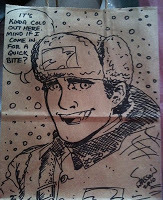
Another illustration by Justin Wasson
With the editing process, I put to use the great tips and lessons I'd learned about narrative voice at the conference, and I think the story really pops now. The original narrative was just so uptight and heavy (like most of my narratives unfortunately...that is my weakness as a writer). I also cut about 3000 words worth of info-dumping and other unnecessary words. On my next blog, I'll post some passages so you can see the difference. But even with the voice issues, the book was better and less simplistic than I remembered it being. It's a good book. It was time I forgave it and gave it the chance it deserved.
With The Stargazers, I intend to attack it again after a few months to give it the same sort of attention that I can't right now because its current rhythms are so embedded in my brain, and I will start the query process anew, because I believe the book can and will be published someday. Every professional who has read it so far has had the same thing to say: "Concept is great, but the voice needs to be stronger." My query has caught the attention of some pretty big agents. So I just need to let the manuscript live up to its promise.
Finally, I have two (well, actually three...no wait, FOUR) projects in the works. First is a diselpunk noir/murder mystery, Colt Coltrane and the Lotus Killer. If you like pulpy, dark stories featuring hardboiled detectives in an anachronistic 1940s Los Angeles with a little bit of H.P. Lovecraft mixed in for fun, this is for you. If you're wondering whether I was inspired to write this by my obsessive play of the new game L.A. Noire, you'd be right. Hey, I've always wanted to write a story like this, but now I actually feel inspired.
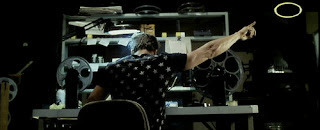 I'm also putting together a short story collection for release on Smashwords and Amazon later in the summer called Cigarette Burns. It'll feature about 10 stories, some previously published work, some already written but never published, some as yet written but in my head. Why that title? Because in searching for a common theme among my short work, I think most of the characters experience a "dark spot" in their lives that signals a "changing of the reel." So to speak.
I'm also putting together a short story collection for release on Smashwords and Amazon later in the summer called Cigarette Burns. It'll feature about 10 stories, some previously published work, some already written but never published, some as yet written but in my head. Why that title? Because in searching for a common theme among my short work, I think most of the characters experience a "dark spot" in their lives that signals a "changing of the reel." So to speak.The third project will be a return to my co-authoring steampunk project with Ian Healy, The Oilman's Daughter. It's taken forever to get this one rolling again, but we're about 40,000 words in, and a recent re-read of the material affirms that it's a hell of a story that needs to be finished.
Last but not least, I'm finally bringing about a return to my movie review site, ReviewKu. Originally intended to be a haiku-film review fusion, it's going to be featuring mostly straight-up reviews and other musings on movies. Though I'll probably throw in some haiku for the hell of it. For those who don't know, I used to write movie reviews many years ago, and for whatever reason (namely laziness), I gave it up to pursue other things. Reading some of my old pieces recently, I realized that many of them were pretty damn good. And I miss it. So expect to see an announcement about the revamped site in the next few months.
Well, that's my present and immediate future as a writer. Great things are happening, and I look forward to seeing what the later part of the year brings. Glad to have you all along for the ride, and do check out Scarlet Letters. It's the best three bucks you'll spend on a laugh. Promise.
Published on May 26, 2011 14:18
May 19, 2011
Busy Work, Reading Logs, and My Middle Finger
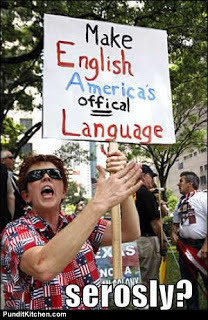 Dear Educators,
Dear Educators,I hear all the time about how the standards in our education system aren't high enough. Students in American public schools are performing woefully low in the areas of math and science. And as demonstrated by many protest signs, literacy rates are equally appalling.
I used to wonder why this was. And then I had a couple kids of my own and sent them off to school, only to learn that what was truly appalling was how very unproductive their time was during those six hours they were gone every day. And I don't mean that they were doing nothing while they were at school. Oh, I know they're doing stuff. Their bags come home every day packed with the evidence of it. Myriad worksheets with myriad scribblings of numbers and letters. The occasional writing assignment here and there. Occasionally there is the indication of some kind of kinesthetic learning via an art or science project. I sure wish I could see more of that. But I'm sure there are things like time and budget to consider.
So no, I don't think the lack of productivity is evident in the volume of work I'm seeing done. It's rather in the IMPACT of that mountain of worksheets, and how, to make up for that lack of impact, kids are carting home more and more work to do after hours. This, I find fundamentally unacceptable.
I'm sure are some teachers who understand that busy work does not equal learning, but I have yet to meet one yet. I guess they're too busy making sure there isn't any child left behind. And they must do so by pulling them along on a sledge made out of worksheets and reading logs.
 And let's talk for a minute about those reading logs. This simple form that's supposed to constitute a "partnership" between parents and teachers to encourage reading is nothing more than a meddling, micro-managing ploy by educators to turn reading into a chore for kids who should by all rights be learning how to read for pleasure. By turning the log into a source of failure and stress for a kid, which will be naturally associated with the act of reading over time, your reading logs are having the opposite effect they're intended to have. And how exactly is this a partnership when, regardless of my stance on the issue, my child is punished for not cooperating?
And let's talk for a minute about those reading logs. This simple form that's supposed to constitute a "partnership" between parents and teachers to encourage reading is nothing more than a meddling, micro-managing ploy by educators to turn reading into a chore for kids who should by all rights be learning how to read for pleasure. By turning the log into a source of failure and stress for a kid, which will be naturally associated with the act of reading over time, your reading logs are having the opposite effect they're intended to have. And how exactly is this a partnership when, regardless of my stance on the issue, my child is punished for not cooperating?Where exactly is MY say in this ritual?
This morning, I signed my last reading log. I won't be enforcing that sheet at home any longer. My kids have enough to do when they get home, the most important of which is spending time with their family in the relaxing and warm environment my husband and I have created for them. One that has made them the easy-going and intelligent kids they are today.
Oh sure, those math and spelling worksheets wait for no one, but if they want to unwind and stick their heads in a book for a little while, I won't subject them to the tedium of writing down what pages they read. They know these things. I know they know these things. I'm a writer. My husband I are both avid readers. Words and the reading of them are big priorities around here. It's evident in my kids' vocabularies and their reading comprehension levels, which have been consistently at least a grade ahead since they started attending school.
In fact, I think reading logs are an invasion on the way I choose to run my home. And my new policy is that I'm no longer going to be a "partner" in something that's really nothing more than a form coercion endorsed with my initials every day. Now, instead of my signature, you're going to be getting my middle finger.
If you want kids to live up to a higher standard as they make their way along the educational path to success, stop putting so many goddamn tacks in the road. Make better use of a kid's (and a parent's) time by making education engaging and memorable rather than simply "busy." Enough with the agendas, logs, and worksheets. Stop turning my kids into paper pushers.
As for those reading logs, when they come in next year, I'll be encouraging them to do what any kid would do with a useless piece of paper:

Published on May 19, 2011 06:55
May 9, 2011
Technique vs Art
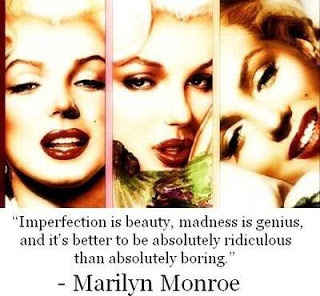
I was watching an episode of my favorite cooking show last night, Chopped, when I discovered the competition was forming itself into the classic battle between flawless technique and pure authenticity. I had this discussion before after I saw the movie Black Swan, so this seems to be a recurring theme for me.
There was the young but eager guy fresh from culinary school who made everything he put on the plate look like something out of MoMA, and his opponent was Mr. Meat and Potatoes, an executive chef at a steakhouse who had been in the business for thirty years, but didn't have much formal training.
While both chefs had obvious talent, they both had their flaws. The Meat and Potatoes guy wasn't the most creative, and his dishes lacked a certain flair and unity that a more trained chef would be able to accomplish. And the super artsy chef, while making some really bold and creative choices, was putting otherwise bland and insipid tasting food on the plate.
Can anyone guess who won?
It was the steakhouse guy. While his food was not very elegant, the judges enjoyed eating it more. The artsy chef was producing food fit for magazine covers, but none of his heart or soul really went onto the plate. It was entirely cerebral, and the guy knew it. I think it's something a lot of would-be artists (self included) struggle with.
And that's where the metaphor for writing (or any other art) comes into play. If you're so consumed by looking perfect and following technique to the letter, I can guarantee your writing will have no soul. It'll be boring and no one will remember it. People read to be emotionally moved, and sterile writing will never accomplish that. As far as I'm concerned, real beauty comes out through people's flaws. It's what makes them unique and gives them a flavor no one else has. This isn't to say technique isn't important, but what separates a technician from an artist is that the artist has the sense and the intuition to know that technique should never get in the way of authentic expression.
 Don't be afraid to get yourself a little dirty. If your sentence demands an adverb now and then (especially because it meshes well with the persona of your narrator, or because you can think of no better way to express that precise feeling in that moment of your character's life) fucking use it. Sometimes, when you scrub your work of every potential "flaw," you're robbing the readers of your voice.
Don't be afraid to get yourself a little dirty. If your sentence demands an adverb now and then (especially because it meshes well with the persona of your narrator, or because you can think of no better way to express that precise feeling in that moment of your character's life) fucking use it. Sometimes, when you scrub your work of every potential "flaw," you're robbing the readers of your voice.But most importantly, people would rather read, eat, or view art that isn't produced by automatons. As for those who read for a living (editors, agents), they can tell the difference between a lazy, unskilled writer and a one who is in enough control of the craft to commit a few "sins" while still getting the job done.
It's a tough balancing act, but I think the most important thing any writer can do is to get the hell out of his/her own head and just let the work (and themselves) breathe.
Published on May 09, 2011 09:48
May 2, 2011
Big Conference, Big Mountains, Big Hopes, Big Fears

Pikes Peak and the road ahead
The Pikes Peak Writers Conference is over, and now that I'm installed back on my favorite seat in the house, at my favorite altitude, I figured I'd take a few minutes and share some highlights and lowlights of the experience.
It was my first major conference. I'd attended a few local events several years ago, but not at a time when I could have gotten as much out of the workshops as I can now that I'm actively pursuing publication with finished work. The Pikes Peak conference is one of the biggest of such events in the country, and because some great friends of mine also live in the Colorado region, it was a fantastic way to get to meet them as well as further my writing career.
As far as the latter was concerned, I had two goals in mind when I decided to attend this year's event. I wanted to attend workshops that would help strengthen my writing in key areas (namely voice, but that's going to be in a future blog) and I wanted to entice an agent with my latest manuscript to the point that they would request more materials. I'm happy to say that I achieved both of those goals.
I pitched to agent Joanna Volpe of the Coffey Literary Agency, and she was fantastic and friendly in spite of my nerves, which I never could completely conquer before going in. The first moment you sit down to discuss your work with an industry professional is one of the most nerve-wracking in existence. At least it was for me. Writing is such a solitary thing, and the first time you come out from under a rock to seek validation for it in public can be terrifying. It's like any other audition, only it's for a particular talent that largely exists behind closed doors. Rarely do we write aloud in front of audiences. But she did attempt to break the ice by complimenting my shirt, and that helped. After I got my legs under me at least a little, I pushed through, and although my words were rushed and shaky, and although I wandered so far off my carefully rehearsed discussion points (due to many of the questions she asked, which I'm thankful she did, because it also allowed me to discuss parts of the book I might otherwise have missed), she was interested enough to request the first 50 pages. Do I have the highest hopes that she will fall in love with those pages, request the full manuscript, and then promptly sign me? Of course. Do I think it will happen? Absolutely not. But hey, you have to tell yourself these things in order to keep going. "No" is a word you expect to hear until the "Yes" comes.
I also attended a Read and Critique session. That was on Friday afternoon, and it involved a group of 30 people gathering with an agent and each of us reading our first pages aloud (also nerve-wracking) and allowing the agent time to give us a critique on her first impressions of the story--what grabbed her, what didn't. This is important, because it gives you a clue as to what might make an agent or an editor decide to reject your writing or ask for more. I knew going in that I had a particular problem, because my original draft began with a prologue. For those who don't know, a prologue often puts a writer at a disadvantage while shopping around work. Agents and editors are wildly divided on a prologue's usefulness. While some are completely open-minded about the process, others have a strict "I hate them" policy and will often reject work on the spot that contains a prologue because they see it as a sign of weak storytelling. It just so happened that the agent I was reading to was one of these types.
However, her criticism had a lot of merits. She said my particular prologue's voice didn't match the genre of what I was writing, and you know what? She was right. While she gave me a lot of kudos for my descriptiveness and general writing ability, that was the main stumbling block. The prologue was crippling my chances to even get my story read by publishers and agents. It had to go. And now that I've eliminated it and have set about sprinkling its pertinent parts throughout the book, the story is a lot stronger for it.
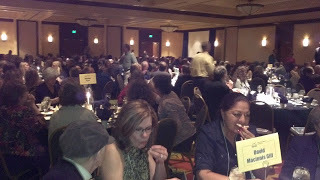
Are any of these people as terrified as I am?
Overall, the experience at Pikes Peak was a positive one. I met so many friendly people (and great writers) and learned a lot about the craft and the industry. If I return next year, my goal is to put myself out there even more, and that means swallowing all of my fears and doubts about my work and not being afraid to pitch to other attending agents and editors. Many of the writers there do this in the course of dinner conversation and social engagements, but I just couldn't quite go there yet. I was struck with blind terror at the prospect of pitching at a scheduled appointment. The thought of doing it spontaneously in a hallway or over a meal... forget about it. First of all, I have a lot of illogical fears to overcome, but I also know my personality. Until I feel comfortable in a situation, my first instinct is to hold back until I do. Or until I've had a few drinks. Maybe I should have been pitching after a few Cosmos.
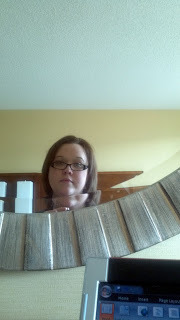
Rehearsing the pitch, take 1000
As such, I kept to myself a lot, and seeing people who didn't have such fears getting multiple manuscript requests was discouraging to me at times. There was a low point Saturday afternoon where I holed myself up in my room and cried for a little while, completely convinced of my cowardice, lack of talent and ambition, and the futility of even trying to pursue this dream. But then I got it out, fixed my makeup, and focused on my breathing and my story (which is GOOD, dammit, even if I have trouble believing it at the times when I feel most vulnerable). I stumbled through my pitch and got a positive response, and even if I don't get any more out of it than that -- even if Ms. Volpe rejects my manuscript, I can at least say that I'm making baby steps toward a larger goal. I just have to keep moving forward. Retreat isn't an option at this point.
As one of the many speakers at the conference said during a particularly motivating speech, you have to be present to win. I'm going to remember that as I soldier forward. I'm present and I'm not going anywhere. As long as I keep that in mind, I will win someday.
P.S. There is a lot more I learned and experienced at the conference (and my overall visit to Colorado--like my how my aversion to high altitudes is completely incompatible to my love of beautiful mountains) that I couldn't possibly cover in one blog, so I might be talking about this for a little while.
Published on May 02, 2011 08:29
April 19, 2011
Friendship Should Be Easy

Relationships can be tough. If we compare all the ones in our lives to various types of plants we raise in our gardens--marriages, kids, parents, bosses--we'd find that some are more high-maintenance than others. A marriage is like a bonsai, which needs careful pruning and frequent attention in order to stay looking good. A kid is a lot like a rosebush. In the right conditions and soil, you can can produce some beautiful blossoms, but if you don't handle them carefully, their thorns will make you hurt. Either way, such relationships are a lot of work, and even with regular love and care, they can still sometimes get the best of us.
But friendships are different. While we have to pay attention to them like any other relationship, they shouldn't be arduous in any way. Using the gardening metaphor, a friendship should be no more difficult to keep than a pot of pansies or violets on a sunny windowsill. They should smell sweet and be a source a comfort and pleasure.
A good friendship should allow its individual members to thrive in positive light, but should be hardy enough to weather any storms that come its way. But those storms should be infrequent. A good friendship should allow its members to co-exist as individuals who shouldn't have to live in constant fear of the clouds. Unlike a marriage, where two different people must find a way to survive together for the good of family, children, and assets, a friendship should not be subject to such things. If you can't enjoy each other for the mere sake of enjoyment, then the friendship should cease to exist.
No one, in any relationship for that matter, should wonder if their words or actions might be met with vitriolic rebuke, but this is especially so with friendships. A friend is supposed to be a refuge from those things. Except for cases of tough love if one of us becomes a crack addict, an anorexic, or a Scientologist, we shouldn't have to regularly lay in wait for a shit cyclone to come rolling through our day from someone we call friend.
 And the older I get, the more I realize that I have no problem expecting these things. And while I will always maintain friendships where there are differing viewpoints on certain topics, I expect those who friends disagree with me to do so politely, and if they can't do so, then they should have the decency to say nothing at all. And of course I'll do the same, because I want to continue being a source of smiles, comfort, and amusement for my friends, and if I ever become a bore, I welcome anyone to depart. Maybe I'm not for you. That's okay. If we can't provide light for one another in this dark ass world, then we should freely look elsewhere for people who can.
And the older I get, the more I realize that I have no problem expecting these things. And while I will always maintain friendships where there are differing viewpoints on certain topics, I expect those who friends disagree with me to do so politely, and if they can't do so, then they should have the decency to say nothing at all. And of course I'll do the same, because I want to continue being a source of smiles, comfort, and amusement for my friends, and if I ever become a bore, I welcome anyone to depart. Maybe I'm not for you. That's okay. If we can't provide light for one another in this dark ass world, then we should freely look elsewhere for people who can.If I ever made any of you feel terrible or like less of a person because of my particular passions, I apologize. I'd rather live the life of a wounded ant than to step on anyone I care about just to feel a little bit bigger.
Published on April 19, 2011 19:47
April 7, 2011
On Stargazers
 I just completed the third draft (and pretty much final, save for some much-needed proofreading and line edits) of my second full novel, The Stargazers, and this is the part that's the most unnerving. In fact, I should be writing a query for it right now, but I find myself here blogging about it in hopes that speaking about the novel in a more purposeful way will help me segue into writing a sales pitch.
I just completed the third draft (and pretty much final, save for some much-needed proofreading and line edits) of my second full novel, The Stargazers, and this is the part that's the most unnerving. In fact, I should be writing a query for it right now, but I find myself here blogging about it in hopes that speaking about the novel in a more purposeful way will help me segue into writing a sales pitch.Unlike Scarlet Letters (my first book, which was a humorous urban fantasy with no other point than to poke fun at the pop culture phenomenon of vampires), Stargazers is far closer to the kind of writing I typically do in that it is fairly dramatic and dark, and tries to be at least somewhat thematic. Aster, the main character, experiences some some pretty black moments on her journey, but I like to think I've balanced those things with just enough lightness and action to keep the story from being dirge-like. With the help of my beta readers, I was able to take the story to the next level in terms of plot and character development, making the story richer and very much what I first envisioned it to be when I started it back in November for NaNoWriMo.
The story has magic, a little bit of romance, and also some themes that are very personal to me. The main one is family obligation vs personal freedom, or making that leap from childhood (where our thoughts and beliefs are often a carbon copy of our parents'), to adulthood, where we must start to establish ourselves as individuals and allow ourselves to bloom, regardless of whether or not our family would approve. I tried to speak about this very real struggle in a metaphorical way, framing it in a fantasy story about a family of witches.
I struggled a lot with forging my individuality as a teen, and I've carried that struggle with me into adulthood. In fact, it's only recently that I feel like I've really started to claim my life as my own, and because I wrote this book for teens, I feel like this was a way to telegraph back in time, to tell myself to be strong and confident in who I am, that even when there are times when I feel completely lost in the dark, there is still enough light in the world to help me find my own way if I trust myself.
I can only hope that same message comes through for other readers.
Other themes and metaphors were so buried in the subtext that I didn't even know they were there until I was in the middle of revisions or until someone pointed something out to me. I think those are my favorite discoveries, as it reminds me that writing is by and large a subconscious process.
Anyway, I don't know if it's perfect even now (or if it ever will be, but I have to eventually leave well enough alone and let the work stand on its merits), but I feel I've nurtured Aster and her world(s) pretty well, and I hope to be able to revisit her again someday and see how she's doing and if she has another adventure to show me. But first, I have to write that query. Then, maybe if it goes all the way, I can start planning that sequel.
Published on April 07, 2011 21:14
March 24, 2011
Self-Publishing and the Indie Hipsters Douching It Up
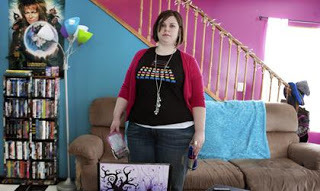 There are some some major shifts happening in the publishing world lately.
There are some some major shifts happening in the publishing world lately.In the last few days, we've had big news of Kindle millionaire sensation Amanda Hocking leaving the self-publishing wings for a (rumor has it seven-figure) traditional book deal at St. Martins Press and bestselling thriller author Barry Eisler has left a half-million dollar book deal behind in order to self-publish.
Two very different authors making two very different decisions for two very different reasons. And both having me tilting my head and putting on my patented WTF look.
Eisler's move confounds because he kicked a very lucrative sure thing (and probably his agent) in the mouth in the hopes of capitalizing on the self-publishing trend that seems to be generating waves all over the place thanks to J.A. Konrath and others who have carved out a niche for themselves selling ebooks on the Kindle marketplace at $2.99 a pop. This may or may not work out better him. It'll take selling roughly 250,000 ebooks for Eisler to earn out what would have been his $500,000 advance from the traditional publisher (of course, the publisher was offering that half-mill for a 2-book deal, so his odds of doing well on a per-book basis are slightly better). What he's getting in return, of course, is more creative control and ultimately more in royalties than he might from the traditional market, two of the biggest pulls of self-publishing right now. But it will take time to build that, especially without a publisher's marketing machine behind him, and he will have to of course supply his own editing and artwork from that budget.
 It's possible he'll do well, sure. Hocking has half a million books ebooks in less than a year. But she's also writing in a genre that's competing directly with Twilight, which is more popular now than Jesus skateboarding across the Sea of Galilee with Harry Potter on his shoulders. Eisler writes thrillers, which is another popular genre, but I don't think he'll be turning Twihard numbers anytime soon. So it's a gamble.
It's possible he'll do well, sure. Hocking has half a million books ebooks in less than a year. But she's also writing in a genre that's competing directly with Twilight, which is more popular now than Jesus skateboarding across the Sea of Galilee with Harry Potter on his shoulders. Eisler writes thrillers, which is another popular genre, but I don't think he'll be turning Twihard numbers anytime soon. So it's a gamble. But back to Hocking. Here she is already a proven commodity in the self-publishing world. She's probably the poster girl for the ultimate success story that any self-publishing hopefuls could look at and aspire to be, and she seems like a pretty cool and humble chick who just wants to write and be read and never thought of the money or about being any sort of activist when she got into self-publishing, so I don't think of her as a sellout. But there are some who undoubtedly do. Most people self-publish with a dream in mind to be just like her. This is a fine (if slightly deluded) aspiration to have (face it, Hocking is the Powerball of self-publishing), but here's the thing that sticks in my craw.
I've read articles over at Konrath's blog ridiculing people still sniffing at the asses of "legacy" publishers. Mainstream writers been called vain and foolish (in so many words), seeking the approval of others when they could be forging their own way in this new digital frontier, making bank, reaching readers, while maintaining all rights over their stuff. Konrath in particular has painted self-publishing as a mecca for the self-aware non-sheeple of the writing world who have decided that they're too good to need validation from the traditional publishing world.
 It's all bullshit, of course, but he's entitled to his opinion. Of course, if it's so great, why are Konrath, Eisler, and these supposedly principled self-publishing juggernauts now bitching about not being included on the NYT Bestseller lists? Look, there are certain things you sacrifice when you eschew the mainstream. You likely won't be considered for any major book awards. You probably won't be reviewed by any major book review house like newspapers, Kirkus and Publishers Weekly. It's not as likely your book will be optioned for film rights. And it's highly, highly unlikely your sales will be recognized alongside those of the traditional publishing industry. When you make a principled decision to turn your nose up at that sandbox, you can't then claim some sort of faux oppression for not being allowed into said sandbox. When you burn down your house, you can't be mad when the insurance company doesn't cut your arsonist ass a check. When you decide to go vegan, you can't be pissed that cheeseburgers are off the menu.
It's all bullshit, of course, but he's entitled to his opinion. Of course, if it's so great, why are Konrath, Eisler, and these supposedly principled self-publishing juggernauts now bitching about not being included on the NYT Bestseller lists? Look, there are certain things you sacrifice when you eschew the mainstream. You likely won't be considered for any major book awards. You probably won't be reviewed by any major book review house like newspapers, Kirkus and Publishers Weekly. It's not as likely your book will be optioned for film rights. And it's highly, highly unlikely your sales will be recognized alongside those of the traditional publishing industry. When you make a principled decision to turn your nose up at that sandbox, you can't then claim some sort of faux oppression for not being allowed into said sandbox. When you burn down your house, you can't be mad when the insurance company doesn't cut your arsonist ass a check. When you decide to go vegan, you can't be pissed that cheeseburgers are off the menu. So what do you really want, "indie" folks? Do you want to be completely off the teat or not? Do you really not care about validation from traditional publishing gatekeepers and reviewers? Or do you want to be mainstream, but are just spouting your self-righteous bullshit in order to make yourself feel better about being up in the nosebleed seats in the arena of public awareness? I won't lie. I want the brass ring. I want someone in a New York high-rise to say I'm awesome enough to be let into their exclusive club so that my books will be on store shelves with blurbs on the back cover, even if I make less money than you. I want it so bad I can taste it, and I'm not afraid to admit it. And I'm keeping my eye on the self-publishing market too, waiting for the tide to truly shift. Not for you to tell me it's shifting. Really, it's been shifting for a decade or more. Wake me up when the new paradigms are finally in place.
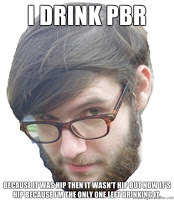 At any rate, it's nice to see writers making their own choices in the widening market. Time will tell who will fare better. We're all full of opinions and there is no right or wrong at this point. But I think I've heard enough indie-hipster bullshit from the self-publishing crowd to make my brain feel saturated with PBR.
At any rate, it's nice to see writers making their own choices in the widening market. Time will tell who will fare better. We're all full of opinions and there is no right or wrong at this point. But I think I've heard enough indie-hipster bullshit from the self-publishing crowd to make my brain feel saturated with PBR.
Published on March 24, 2011 15:44
March 16, 2011
Dear Mrs. Obama
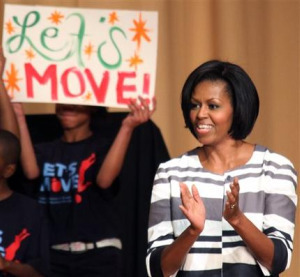 I admire you in many ways, but I need to speak plainly to you about your Let's Move campaign aimed at "fighting" and/or "defeating" childhood obesity by first telling you that while your intentions seem to be in the right place, this is a terrible idea that will have horrible consequences for our already ailing society.
I admire you in many ways, but I need to speak plainly to you about your Let's Move campaign aimed at "fighting" and/or "defeating" childhood obesity by first telling you that while your intentions seem to be in the right place, this is a terrible idea that will have horrible consequences for our already ailing society.I speak to you as a fat woman who grew up as a fat kid. Fat by your (and everyone else's) standards, anyway. Even at my most active and health conscious, I've always been at least 30 pounds overweight, and by any medical standard, that makes me obese. I've always had good to excellent health, but a few things have started to creep up on me. Most of those things exist in my family (who is by and large not obese) and are likely genetic, but many would try to blame it on my weight, simply because that's the easy thing to do.
I've spent 31 years in this body and for roughly the last 21 years, I've been stabbing myself with metaphorical knives of fat hate. I've dieted, only to gain the little weight I've lost back and then some. I've put myself down so much for being fat that when I read back some of the words I've written in blogs about myself, I want to cry. Because no one should hate themselves as much as I have hated myself.
 And I see the results of my years of self-hatred reflected in my kids now. I have an 8-year-old son who utters the word "fat" like it's a curse word, and I sometimes wonder if he's made fun of any fat kids at school. It wouldn't surprise me if he did, but that's my fault, not his. My 9-year-old daughter draws pictures of herself that make her look like an emaciated supermodel, in stark contrast to the curvy body she is currently growing, one that will likely resemble her mother's someday. I live in fear that she will look at her little pooch of a belly and think she can starve it off, like I once did when I was just about her age. I don't know that I will ever forgive myself for inadvertently planting the seeds in their brains that fat is a defect. But I've done my best to start reversing the damage. They love being outside and they love the green smoothies I'm making for them. I'm trying to make them as socially conscious their father and I are so that they will make choices not merely because they want to maintain a svelte figure, but because the health of their bodies and that of our planet matters.
And I see the results of my years of self-hatred reflected in my kids now. I have an 8-year-old son who utters the word "fat" like it's a curse word, and I sometimes wonder if he's made fun of any fat kids at school. It wouldn't surprise me if he did, but that's my fault, not his. My 9-year-old daughter draws pictures of herself that make her look like an emaciated supermodel, in stark contrast to the curvy body she is currently growing, one that will likely resemble her mother's someday. I live in fear that she will look at her little pooch of a belly and think she can starve it off, like I once did when I was just about her age. I don't know that I will ever forgive myself for inadvertently planting the seeds in their brains that fat is a defect. But I've done my best to start reversing the damage. They love being outside and they love the green smoothies I'm making for them. I'm trying to make them as socially conscious their father and I are so that they will make choices not merely because they want to maintain a svelte figure, but because the health of their bodies and that of our planet matters. But you know what? Those same seeds of self-hatred were planted in my brain and they were planted in the people who planted them in mine. And now you're working hard to sow them into the minds of our youth at a time when people in this country are more volatile than ever toward those who are "other."
I just cannot abide by that.
Our heavier-than-average children are not defects that need to be fixed. What you should be addressing is our country's overall approach to health and nutrition. The government you and your husband represent is in bed with agricultural lobbies and corporations that seek to genetically modify our food supply to boost profits. GMOs may have devastating effects on our health and environment, the longterm of which has yet to be observed but may already be happening. Meanwhile, you're subsidizing a grain industry that stuffs GMO corn into cattle that have 40% more saturated fat and far greater risk of e. coli infection than that of naturally grass-fed cows. And the chemicals and feces from the agricultural run-off created by our government-subsidized industrial farms has contaminated lakes and rivers and oceans, destroying entire ecosystems. It has also caused foodborne illness in vegetation crops. We're getting e.coli on our spinach, strawberries, and in our peanut butter. Food recalls are through the roof as the industry deregulates itself. Kids of all shapes and sizes are DYING because of illnesses caused by industrial farming. Why aren't you bringing attention to that?
 To make it worse, that same government-subsidized grain is also going into chemical sweeteners that then go into the cheap processed foods that people who are struggling in this economy (destroyed by the very corporations and banks that your government bailed out) buy because it's all they can afford. These sweeteners have been shown to have a very detrimental effect on people's health and metabolisms. People then seek out pharmaceuticals to treat the ailments--their diabetes, their high cholesterol, their cancer--caused by this industrialized food. And all this, of course, makes the drug companies--which are given massive tax breaks and other subsidies by our government--richer by the minute. And all this, of course, creates a great conflict of interest when it comes to doing the truly healthy stuff, doesn't it? You represent a government that has inextricably linked the overall health (or lack there of) of our nation to the wealth of corporations and their shareholders. Millions are suffering for the financial benefit of a few.
To make it worse, that same government-subsidized grain is also going into chemical sweeteners that then go into the cheap processed foods that people who are struggling in this economy (destroyed by the very corporations and banks that your government bailed out) buy because it's all they can afford. These sweeteners have been shown to have a very detrimental effect on people's health and metabolisms. People then seek out pharmaceuticals to treat the ailments--their diabetes, their high cholesterol, their cancer--caused by this industrialized food. And all this, of course, makes the drug companies--which are given massive tax breaks and other subsidies by our government--richer by the minute. And all this, of course, creates a great conflict of interest when it comes to doing the truly healthy stuff, doesn't it? You represent a government that has inextricably linked the overall health (or lack there of) of our nation to the wealth of corporations and their shareholders. Millions are suffering for the financial benefit of a few. THOSE are the defects that need addressing. That is the campaign you should be waging. And that's only the very tip of a very sick iceberg.
Mrs. Obama, leave the fat kids alone. They never did anything to you. But you and the rest of this country who has its head on backward about health, nutrition, and body image are doing a hell of a lot to hurt them by reinforcing the damaging message that there is something wrong with them because they're bigger than other kids.
Published on March 16, 2011 08:39



